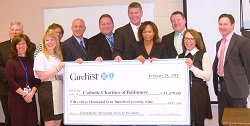 Millions of Americans – about 96.4 million, according to a 2014 assessment by the Health Resources and Services Administration– live in areas that face a shortage of behavioral health professionals. These key members of our medical community provide care covering a vast array of issues, from anxiety disorders and depression to learning disabilities, but they are in short supply. And as the numbers of people seeking treatment rise, so do the barriers to access in many parts of the country.
Millions of Americans – about 96.4 million, according to a 2014 assessment by the Health Resources and Services Administration– live in areas that face a shortage of behavioral health professionals. These key members of our medical community provide care covering a vast array of issues, from anxiety disorders and depression to learning disabilities, but they are in short supply. And as the numbers of people seeking treatment rise, so do the barriers to access in many parts of the country.
Recognizing that the well-documented lack of behavioral health professionals is even more acute in rural and underserved areas, CareFirst BlueCross BlueShield (CareFirst) developed an innovative plan to leverage technology to allow increased access to crucial care. As part of Blue Cross and Blue Shield companies’ commitment to the Power of Blueâ„ - the power to make a difference in and improve the health of the communities we serve – CareFirst provided multiyear grants to four community health organizations in Maryland and Washington D.C. to expand the use of telemedicine in rural and underserved areas.
Telemedicine allows patients and physicians to connect via secure online video conference, greatly expanding the area in which a behavioral health professional is able to provide care.
The expanded reach of telemedicine made possible by the CareFirst grants includes the extension of video-conferencing technology to about 120 underserved children in schools in Baltimore and the counties of Anne Arundel and Allegany through the Associated Catholic Charities Mindcare for Marylanders’ program. A grant also helped La Clinica del Pueblo, a health center that serves the Latino and immigrant populations in the Washington, D.C., metro area, expand remote access to its bilingual counselors and healthcare providers through teleconferencing to about 650 patients.
Sheppard Pratt Health System is now able to use teleconferencing and video-conferencing tools to provide access to its psychiatrists based in Towson, Maryland, to about 1,200 patients of federally qualified health centers. And Atlantic General Hospital (AGH) used funds from the grant to partner with the internationally renowned Baltimore-based Kennedy Krieger Institute (KKI) to provide initial evaluations and follow-up visits to about 325 children and young adults with learning disabilities and behavioral health issues. For current KKI patients, the partnership with AGH greatly reduces travel costs for patients and their families.
Across the country, the independent Blue Cross and Blue Shield companies are using The Power of Blueâ„ to improve healthcare access, enable healthier living, and improve healthcare quality and affordability in our local communities. To find more examples of The Power of Blueâ„ in action, download the full Investing in America’s Health report.

